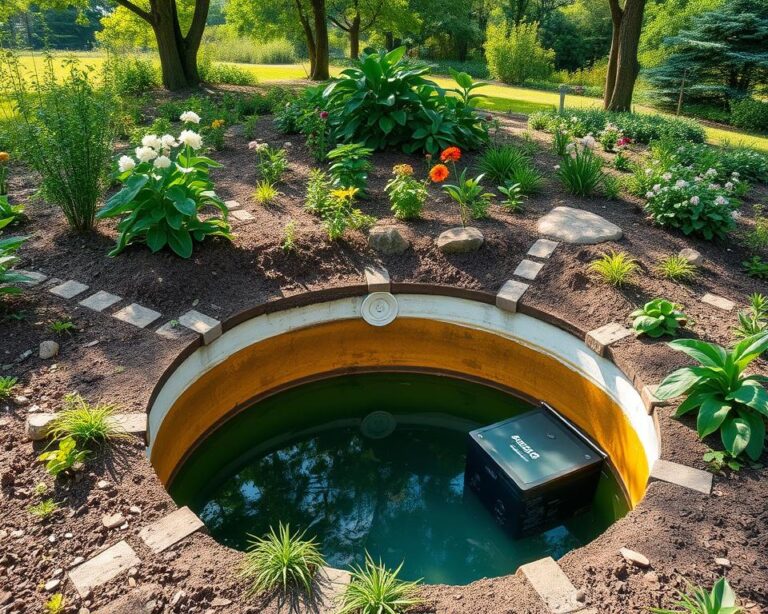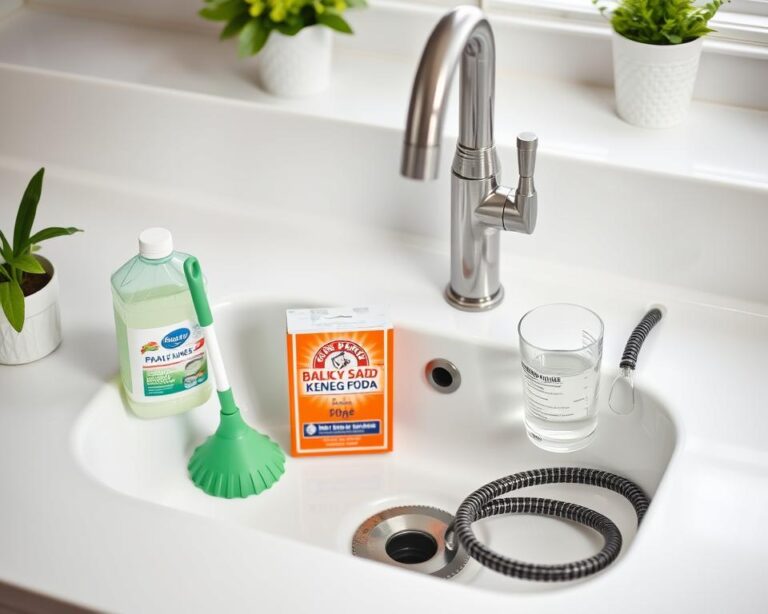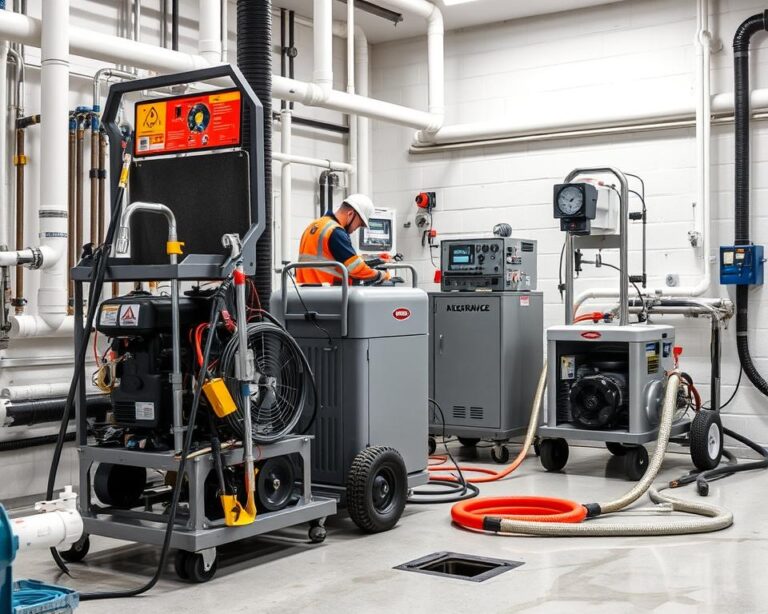Maintaining clear drains is crucial for any home, as clogged sinks can disrupt daily routines and lead to costly plumbing repairs. The right sink clog remover not only tackles existing blockages but also prevents future issues, making it essential for effective drain cleaning. Common clogs can result from various factors, including grease buildup, food debris, and hair trapped in plumbing systems. By understanding these causes, homeowners can choose the best sink clog remover to ensure smooth functioning and longevity of their drainage systems. It is worth noting that methods such as boiling water, vinegar and baking soda, hand plungers, and even plumber’s snakes offer viable alternatives to heavy-duty chemical solutions while promoting environmental safety12. Choosing a reliable product can ease drain maintenance and contribute to long-term plumbing health3.
Understanding Sink Clogs: Causes and Effects
The causes of sink clogs often originate from various common clogging materials. Hair is frequently cited as a primary culprit behind clogged drains, particularly in bathroom sinks and showers45. Grease buildup is a major issue, especially in kitchen sinks, leading to sticky sediments that can create serious blockages56. Other common clogging materials include soap scum, organic matter, and food particles like starchy foods, which contribute significantly to kitchen drain clogs46.
Leaving clogs unattended can lead to serious plumbing issues, including water damage, mold growth, and costly repairs. Over time, pressure builds in blocked pipes, potentially leading to leaking joints and structural damage within the home4. Addressing these issues promptly can help maintain the longevity of pipes and prevent further complications5.
Types of Sink Clog Removers
Several types of sink clog removers are available, with options ranging from chemical drain cleaners to mechanical drain cleaners. Chemical drain cleaners often contain harsh caustic ingredients, such as lye or sulfuric acid, which work quickly on organic clogs. However, these chemical solutions can also harm pipes if used improperly7. On the other hand, enzyme-based solutions take longer to work but are gentler on plumbing systems, making them suitable for tackling smaller clogs due to grease and soap scum7.
Mechanical drain cleaners, like plungers and drain snakes, require some manual effort. Plungers are highly effective for food or organic material clogs, while drain snakes excel at clearing hair blockages7. Different types of drain snakes cater to specific clogs, including manual drain snakes, drum augers, and toilet snakes, making them versatile tools for homeowners7. For deeper, stubborn clogs beyond the typical reach of plungers, hand augers and sewer rods can be utilized8.
Popular brands of chemical drain cleaners, such as Drano Max Gel Liquid Clog Remover and Liquid-Plumr Hair Clog Eliminator, are widely available in stores and online9. Pricing varies, with options often discounted, such as Liquid-Plumr available for just $5 at Walmart9. Selecting the right type of sink clog remover based on the nature of the clog can ensure effective and safe clearing of drains.
Using Chemical Sink Clog Removers Safely
Chemical sink clog removers can provide effective solutions for draining issues, but their misuse can lead to serious consequences. Annually, approximately 3,000 injuries are caused by chemical drain cleaners10. Many of these products contain caustic ingredients which generate heat and dissolve organic materials, posing risks such as skin and eye burns along with the release of toxic fumes11. Therefore, understanding proper handling is crucial for chemical sink clog remover safety. Users should always wear gloves and goggles and ensure adequate ventilation during the application of these products.
One major concern is that these chemical cleaners can kill all bacteria in drains, including beneficial ones, disrupting the ecosystem that helps manage waste10. While effective at clearing clogs, the harsh chemicals can damage pipes if misused, revealing a potential loophole in their perceived safety11. Regular use of chemical clog removers can mask underlying plumbing issues, which is why it’s vital to view these solutions as temporary fixes rather than a cure-all for persistent problems10.
Eco-Friendly Sink Clog Remover Options
More homeowners are turning to eco-friendly clog removers due to awareness of the harmful effects of traditional chemical cleaners. The use of natural drain cleaning solutions such as enzyme-based cleaners has notably increased in residential settings. For example, products like Bio-Clean utilize naturally occurring bacteria, which safely digest organic waste without harming septic systems. The rise of these solutions is significant as studies show that chemical drain cleaners can cause injuries or burns if they come in contact with skin and complications like organ damage when ingested12.
Baking soda and vinegar remain classic eco-friendly options. This combination boasts a success rate of around 75% in breaking up organic clogs, further indicating their effectiveness as natural remedies13. Additionally, dish soap mixed with hot water shows about a 70% success rate in clearing grease-related clogs, making it a simple yet effective method. For those seeking a more proactive approach, hydrogen peroxide alongside baking soda has shown a success rate of approximately 60% for organic blockages13.
Implementing eco-friendly techniques helps maintain healthier plumbing practices while protecting the environment. When natural drain cleaning solutions fall short, the statistic indicates that around 30% of homeowners resort to professional plumbing services, highlighting the reliance on experts for more challenging issues13. Utilizing these natural solutions not only fosters a safe home environment but also contributes to sustainable living.
Mechanical Tools for Drain Clearing
Mechanical drain clearing tools provide an effective physical means of tackling clogs without resorting to chemicals. Among the most popular options is the drain snake, which can reach deep into pipes to remove stubborn blockages caused by debris like hair and soap scum. The average person sheds 50 to 100 hairs each day, leading to significant buildup in drains, especially in showers14. A plunger is another essential tool that creates suction, allowing water to be pushed or pulled, thus dislodging the clog. Familiarizing oneself with these tools can dramatically improve your plumbing maintenance and provide a cost-effective alternative to hiring professionals15
Using a drain snake requires some basic plumbing knowledge, but when executed properly, it can be a quick solution for various types of clogs. For more challenging obstructions, professionals often rely on sectional cable cleaners, which have cables that can extend up to 15 feet, allowing them to tackle tougher clogs with precision14. Regular pipe inspections are recommended by plumbers at least every two years to identify and address potential blockages before they escalate, ensuring smoother flow in your plumbing systems14.
In summary, investing in mechanical drain clearing tools like a drain snake and plunger can provide homeowners with reliable means of maintaining clear drains. Understanding how to employ these tools effectively can save time and money in the long run.
Preventing Sink Clogs
Effective measures to prevent sink clogs can significantly enhance your drain maintenance habits. Simple practices such as using drain covers can effectively block hair and debris from entering drain lines, addressing common clog culprits. Significant percentages of clogs are caused by improper disposal methods, like pouring grease down the drain, which can lead to serious blockages over time16. Regularly flushing hot water down your kitchen sink can help to mitigate issues from fat or grease build-up17.
The importance of awareness regarding non-flushable items cannot be overstated. Items such as baby wipes, cotton swabs, and feminine hygiene products can cause substantial problems if disposed of improperly, resulting in frequent clogs16. Cleaning drain stoppers in bathroom sinks and tubs on a regular basis is a proactive step in preventing future clogs. Monthly use of a product like Drano® Max Build-Up Remover can help eliminate accumulated gunk and reduce clog risks17.
In addition to these tips, consider the value of professional inspections. Having a professional inspect a septic tank every 2-3 years highlights the necessity for regular maintenance, as it can prevent backups that may lead to costly repairs17. Combined with effective drain maintenance tips, these strategies can remarkably contribute to ensuring clear and functional drains in your household. To explore customized options for your needs, feel free to reach out for assistance.
How to Use Baking Soda and Vinegar
The baking soda and vinegar method is an effective choice for natural drain cleaning. This eco-friendly approach involves pouring baking soda followed by vinegar into the drain, creating a chemical reaction that helps break down clogs. This combination is particularly powerful against mineral deposits and organic materials like grease that often lead to blockage. For optimal results, let the mixture sit for 15 to 20 minutes before flushing hot water through the drain to enhance the cleaning action.
Regular use of the baking soda and vinegar method can help maintain clear drains and prevent future clogs. Cleaning your sinks with this mixture every one to three months is highly recommended, particularly in busy kitchens. Furthermore, implementing additional preventative measures like pouring hot water down the drains weekly can assist in dissolving grease and debris.
It’s essential to be cautious, as severe or persistent clogs may require contacting a professional plumber if DIY methods fail to resolve the issue. Keep in mind that the baking soda and vinegar method works best when combined with good drainage habits, such as avoiding pouring oil or grease down the drain and utilizing strainers to catch food particles. You can find more tips on the effectiveness of this method in the article on baking soda and vinegar drain hacks1819.
Effectiveness of Store-Bought Drain Cleaners
Store-bought drain cleaners have gained popularity for their effectiveness in tackling various types of clogs. Products like Drano and Liquid-Plumr are often marketed as top-rated clog removers, but their use comes with significant risks. Many consumers report that store-bought liquid drain cleaners are commonly ineffective, with zero results experienced by a substantial number of users20. Additionally, these products contain harsh chemicals that can damage pipes over time. Chemical ingredients, including lye and bleach, present serious safety concerns and can weaken both metal and plastic pipes2122.
It’s important to recognize that the repeated use of liquid drain cleaners can lead to cumulative negative effects. They may dissolve pipe glue, cause cracks, and even break PVC pipes20. Furthermore, many chemical drain cleaners can generate heat when reacting with materials like aluminum, potentially leading to harmful conditions20. As a result, using these cleaners sporadically as a temporary fix is advisable while exploring safer alternatives. Methods such as using baking soda and vinegar show promise as eco-friendly solutions and avoid the risks associated with harsh chemicals2122.
For the best outcome, it is often recommended to seek the expertise of a professional plumber. They can address the underlying issues of clogged drains that store-bought options may not resolve, such as sewage backups or broken pipes. Involving a professional ensures long-term solutions without compromising pipe integrity22. Consider utilizing mechanical tools like drain snakes as a safer alternative to harsh chemicals. These options effectively clear clogs without introducing harmful substances into your plumbing system or the environment20.
When to Seek Professional Help
Recognizing the right moment to seek professional plumbing services is crucial in managing household plumbing issues. Persistent clogs can indicate serious underlying problems requiring expert intervention, as many of these issues may be located in difficult-to-reach areas of your plumbing system23. If you notice that clogs occur frequently or affect multiple drains simultaneously, it is advisable to consult a professional24. Home remedies and basic tools like plungers can be useful, but professional assistance is necessary when more severe problems arise, such as sewage backups or persistent odors that do not improve with DIY methods25.
Hair is often a common culprit for clogs, especially in bathroom drains, leading to deeper issues that may require professional help23. Kitchen sinks and dishwashers are additional hotspots for clogs, frequently caused by the improper disposal of food and grease. If you experience a complete pipe blockage, it’s safer to let a certified plumber inspect the situation to prevent further complications23. Remember, proper maintenance, such as using mesh filters and traps, can help prevent these issues from developing in the first place.
Troubleshooting Common Clog Removal Issues
Residents of Louisville, Kentucky often face a variety of common clog removal issues that can hinder sink maintenance. Various materials can contribute to these clogs, such as eggshells, oils, rice, pasta, hair, soap, minerals, dirt, coffee grounds, small objects, beans, and potatoes26. When solving these troubles, many individuals try typical consumer-grade solutions like chemical drain openers, but sometimes these fail to address stubborn clogs27. It is essential to evaluate the effectiveness of the products used, as some clogs demand more than just consumer remedies.
Using DIY methods can offer an accessible alternative to professional help. Options such as a mixture of vinegar and baking soda, plungers, or hand-operated augers can be effective26. The use of a hand-operated snake should ideally involve lengths of 8 to 10 feet to ensure proper reach27. However, safety should always be a priority when handling these tools, as mishandling can lead to injuries or damage to plumbing systems.
In cases where at-home solutions fail, it’s advisable to seek professional assistance. Serious clogs, leaks, or chronic clogging can indicate deeper plumbing issues that require expert intervention26. The cost for such services can reach hundreds to thousands of dollars, emphasizing the importance of thorough initial troubleshooting to potentially avoid high expenses27. Understanding these common clog removal issues aids in effective solutions and helps maintain clear drains.
Conclusion: Choosing the Right Method for You
Selecting the best method for sink clogs largely depends on the severity of the blockage and your environmental considerations. From chemical drain cleaners that are widely available in most stores to mechanical tools like plungers and drain snakes, each option has its unique benefits. For instance, while plungers work effectively for smaller clogs, chemical options may be preferred for tougher blockages, keeping in mind the potential impact on your plumbing system28. Understanding these choices allows homeowners to make informed decisions when choosing sink clog remover.
Regular maintenance, such as flushing your sink with hot water or using a baking soda and vinegar mixture, plays a crucial role in preventing build-up that leads to more severe issues2930. It’s essential to remember that DIY methods may not suffice for persistent clogs, and seeking professional help can ensure effective cleaning while minimizing the potential for pipe damage2830. Thus, employing preventive measures and knowing when to take action are key to maintaining clear drains.
In conclusion, understanding the pros and cons of each method, whether it be eco-friendly solutions or more traditional chemical cleaners, will empower you in choosing sink clog remover that’s best suited to your needs. By taking proactive steps, you can achieve the goal of clear, functional drains in your home292830.
FAQ
What is the best sink clog remover for my plumbing needs?
The best sink clog remover depends on the type of clog you’re dealing with. Chemical solutions like Drano and Liquid-Plumr are effective for tough clogs, while eco-friendly options like Bio-Clean are safer for both your pipes and the environment. For minor clogs, mechanical tools like a drain snake or plunger can work well.
How do I effectively unclog my sink fast?
To unclog your sink fast, start with mechanical tools for simple blockages. If that fails, consider using a powerful chemical drain cleaner for stubborn issues. You can also try the natural method of baking soda and vinegar to break down clogs safely.
Are chemical sink clog removers safe for pipes?
While chemical sink clog removers can be effective, they may damage older pipes if not used properly. Always follow the manufacturer’s instructions, and consider using eco-friendly alternatives for a safer option.
How do I prevent future sink clogs?
Preventative measures include using drain covers to catch hair, avoiding pouring grease and food down the sink, and regularly flushing hot water through your drains. Establishing a routine maintenance schedule can also help keep your drains clear.
What should I do if my sink remains clogged after using a drain cleaner?
If your sink is still clogged after attempting to use a drain cleaner, consider using mechanical tools like a drain snake or plunger. If problems persist, it’s best to consult a professional sink unclogger to diagnose and fix potential underlying plumbing issues.
Is there an eco-friendly solution for sink clogs?
Yes! Eco-friendly solutions like enzyme-based cleaners work effectively to break down organic waste without harmful chemicals. You can also use simple household items like baking soda and vinegar for a natural, safe way to unclog drains.
How often should I clean my drains to avoid clogs?
It’s a good idea to perform drain maintenance every month. Flushing your drains with hot water, using a natural cleaner like baking soda and vinegar, and inspecting for debris can help maintain clear drainage and prevent clogs.
When should I call a plumber for sink clogs?
You should call a plumber if you’re experiencing persistent clogs that don’t respond to common unclogging methods, or if you notice water backing up or leaking from pipes. Professional plumbing services can identify and resolve deeper issues that require expert attention.
Can I use a drain snake for all types of clogs?
A drain snake is effective for many types of clogs, especially those caused by hair and soap scum. However, for tough grease clogs, chemical solutions or professional help may be necessary. Understanding the clog type can dictate the best tool for the job.



